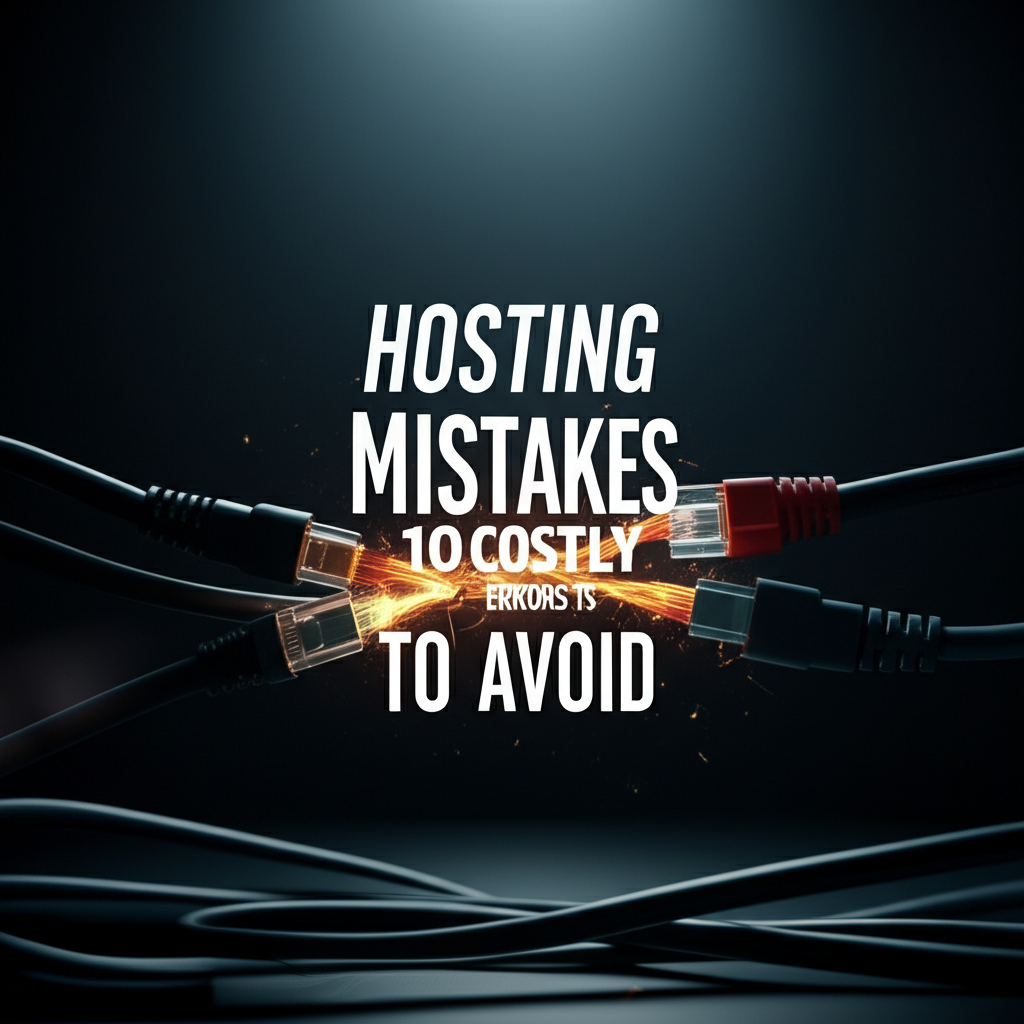- Common Hosting Mistakes That Can Cost You Dearly
- 1. Choosing the Wrong Hosting Plan
- 2. Ignoring Website Security
- 3. Neglecting Backups
- 4. Not Optimizing Website Performance
- 5. Underestimating Bandwidth Needs
- 6. Overlooking Server Resources
- 7. Poor Customer Support Can Be a Costly Hosting Mistake
- 8. Not Monitoring Website Uptime
- 9. Failing to Plan for Scalability
- 10. Ignoring the Terms of Service
Hosting Mistakes: 10 Costly Errors to Avoid
Hosting mistakes can severely impact your website’s performance, security, and ultimately, your bottom line. Choosing the right web hosting is crucial for online success, but even after selecting a provider, several pitfalls can derail your efforts. Avoiding these common hosting mistakes will save you time, money, and frustration in the long run.
Common Hosting Mistakes That Can Cost You Dearly

From neglecting security measures to underestimating bandwidth needs, the following are ten common hosting mistakes that website owners often make:
1. Choosing the Wrong Hosting Plan
One of the most fundamental hosting mistakes is selecting an unsuitable hosting plan. Shared hosting is cost-effective for small websites with low traffic, but as your site grows, its limitations become apparent. Opting for VPS or dedicated hosting might be a better investment if you anticipate significant traffic or require greater control over server resources. Failing to scale your hosting appropriately leads to slow loading times, poor performance, and potentially lost visitors.
2. Ignoring Website Security
Website security is paramount, and overlooking it is a grave hosting mistake. Regularly updating your website’s software, including CMS platforms, plugins, and themes, is essential to patch vulnerabilities. Implementing strong passwords and using two-factor authentication are further crucial steps. Consider investing in SSL certificates and regular security scans to safeguard your website and user data from malicious attacks.
3. Neglecting Backups
Data loss can be devastating, making regular backups a critical aspect of website management. Ensure your hosting provider offers reliable backup solutions and that you schedule automatic backups frequently. Ideally, you should also store backups offsite or in a separate location to prevent losing everything in case of a server failure. Ignoring backups is a risky hosting mistake that can lead to irreversible data loss and significant downtime.
4. Not Optimizing Website Performance
Website speed directly impacts user experience and search engine rankings. Optimizing your website’s performance is crucial for attracting and retaining visitors. Compressing images, minimizing HTTP requests, leveraging browser caching, and using a content delivery network (CDN) are effective strategies to improve loading times. Neglecting website performance optimization is a hosting mistake that can negatively affect your website’s visibility and user satisfaction.
5. Underestimating Bandwidth Needs
Bandwidth refers to the amount of data transferred between your website and its visitors. Underestimating your bandwidth requirements can lead to slowdowns and even service interruptions, especially during traffic spikes. Monitor your website’s traffic patterns and choose a hosting plan that provides adequate bandwidth to handle peak loads. This is particularly important for websites with multimedia content or large files.
6. Overlooking Server Resources
Similar to bandwidth, server resources like RAM and CPU power are crucial for smooth website operation. If your website utilizes resource-intensive applications or experiences high traffic, ensure your hosting plan provides sufficient resources. Monitoring server resource usage is vital to prevent performance bottlenecks and ensure optimal website functionality.
7. Poor Customer Support Can Be a Costly Hosting Mistake
Reliable customer support is essential, especially when technical issues arise. Before committing to a hosting provider, research their customer support options and availability. Look for providers that offer 24/7 support via multiple channels, such as phone, email, and live chat. Poor customer support can lead to extended downtime and frustration when you need assistance the most.
8. Not Monitoring Website Uptime
Website uptime is the percentage of time your website is accessible to visitors. Downtime can significantly impact your credibility and revenue. Choose a hosting provider that guarantees a high uptime percentage, typically 99.9% or higher. Utilize website monitoring tools to track your uptime and receive alerts if your website becomes unavailable.
9. Failing to Plan for Scalability
As your website grows, its hosting requirements will evolve. Failing to plan for scalability is a hosting mistake that can hinder your future growth. Choose a hosting provider that offers flexible scaling options, allowing you to easily upgrade your resources as needed. This ensures your website can handle increasing traffic and evolving demands without performance issues.
10. Ignoring the Terms of Service
Before signing up with a hosting provider, carefully review their terms of service. Pay attention to details regarding resource usage, acceptable content, and account termination policies. Ignoring the terms of service can lead to unexpected fees, account suspension, or even legal issues.
By avoiding these common hosting mistakes, you can ensure your website runs smoothly, securely, and efficiently. Choosing the right hosting plan, prioritizing security, and focusing on performance optimization are essential steps towards online success. Regular backups, adequate resources, and reliable customer support are further crucial elements to consider. Taking the time to address these aspects from the outset will ultimately save you time, money, and frustration in the long run.











Leave a Reply